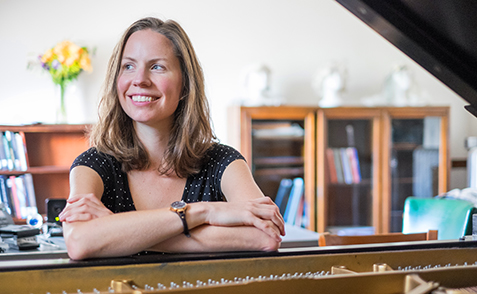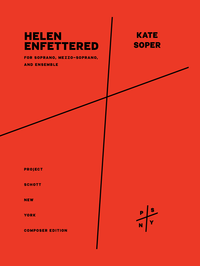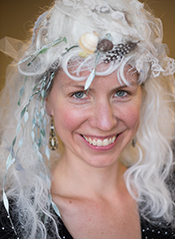

/ Published October 22, 2014
Assistant Professor of Music Kate Soper’s latest work, Here Be Sirens, was heralded by The New Yorker as “an erudite, hilarious and furiously inventive meditation on the siren myth” and by The New York Times as “brainy, baffling and consistently astounding.” Soper explains that the title comes from a phrase used as a notation on medieval maps, scrawled over uncharted waters to signify dangerous unknowns.
If you haven’t heard composer Kate Soper’s music but have read some of the rave reviews, you’ll probably be inspired to look her up online.
Once you start listening to some of Soper’s compositions, such as Voices From the Killing Jar—a work for voice and ensemble that draws upon stories of tragic women from history, literature and myth—it’s guaranteed that, whether you like her work or not, you’ve never heard anything quite like it.
Soper, who is in her second year of teaching at Smith, is clearly doing remarkable and experimental work, stretching the limits of voice and sound to challenge and expand ideas about music—and life.
Asked if she’s intentionally being avant-garde, or bold or brave, Soper humbly replies that she’s just being a composer, writing what comes to her naturally. She gets up every morning and writes because she has to.
In the resulting work, Soper sings, chants, babbles, cries, laughs, talks and stretches sounds out in inventive and unexpected ways. The description of Voices From the Killing Jar, for example, notes that the work “is designed to maximally exploit the artistic range of the ensemble...carrying the listener through sound worlds as complex and diverse as the characters that inspired them.”
So it’s fitting that Here Be Sirens, Soper’s latest work, follows suit. It’s a play/opera/ performance piece, but at some point, you don’t have to be a music expert or intellectual to give over to experiencing the beauty of the music and reveling in the sounds—even (or maybe especially) those that seem odd or piercing.
From the start, Soper knew she didn’t want to create a conventional opera. She didn’t get caught up in limiting Here Be Sirens to a specific musical genre, and she doesn’t seem concerned about following those rules with her other work. “Other people will worry about that on my behalf, whether I want them to or not,” she laughs.
For Here Be Sirens, “It didn’t make sense in this piece to have people singing everything that they normally would say. I just knew there was going to be talking...and because of that the singing would have to be a diegetic source within the opera.”
Soper followed her creative impulses. “There’s something about this opera—it’s funny and goofy, and there are moments that are more traditionally beautiful, and then I’m just throwing it all out there in this crazy bodysuit.”
The siren myth is a fascinating and strange premise that has much to do with being a singer and with the kind of power that gives you, explains Soper.
The Search
As an undergraduate music major, Soper tried taking a more traditional singer-songwriter route, offering her vision in a form that she thought might be more accessible. But, she explains,“Somehow it was just too generic. There were other things I wanted to express that you can’t in a pop song because it has certain aesthetic limitations.”
After a trip to Cassis, France, for a residency with the Carmago Foundation, Soper returned to New York to complete her doctoral work at Columbia. A conversation with a friend helped cement a new mission: Soper realized she wasn’t doing what she wanted. She wanted to pursue something that felt “really natural” and “crucial to get out.” She wanted to write. She wanted to perform with other women. And she wanted to explore deeper themes and directly connect with an audience.
The light bulb for Here Be Sirens went off. On the surface, it’s a seemingly simple plot. Who were the sirens, and how has the myth evolved? In her promotional video for the opera, Soper notes that the sirens “represent pleasurable vices and lust and dangerous sweetness....” Watching their performance, you feel their pull. You’re as entranced as a stranded sailor.
But the piece also encourages you to dive deeper, wondering about things like Why do we exist? What is desire? Are we all trapped in our fates?
In the program for Here Be Sirens, Soper explains that she’s investigating “certain timely conundrums....Is it possible to intellectually enjoy something that is involuntarily pleasurable? What does it mean to be an artist if you never get to meaningfully interact with your audience? And what is the point of infinite knowledge if it only cuts you off from the world?”
Don’t expect tidy answers. As Here Be Sirens’ plaintive ending suggests, sometimes the answers we do find are achingly unsatisfactory.
Does that make the quest—and the search for understanding—any less essential?
Enduring Questions
Here Be Sirens aptly begins in the dark as, one by one, the three characters’ voices fill the room. In the quirky Dixon Place theater in New York, the audience is close enough to see every breath and blink—the kind of “energetic connection” Soper has been seeking.
In the eight ensuing scenes, the sirens project dreamy, hypnotic and harmonious sounds, along with some that are mysterious, haunting, indistinct and discordant.
On stage, the sirens flit about in whimsical, white fishnet costumes (that “crazy bodysuit” Soper refers to)—shells and sea debris attached—with white wigs, white faces and claw-footed boots. The piano is the prominent prop—its own universe of sound. The sirens brush, clang and coax its strings in sensual and unexpected ways.
But Soper doesn’t take credit for much innovation here. “Things inside the piano have been happening for decades,” she says, mentioning [composer] John Cage. “A couple of the sounds I came up with are sort of new—like the timpani on the metal...and using the piano as a resonating chamber. I wanted only the sirens in the show, no instrumentalists, so the piano had to provide all the orchestral texture.”
It feels like a grand experiment, and as in all of Soper’s work, it seems, she is asking, isn’t life? And isn’t our purpose—and the purpose of art—to explore it?
Soper says her work typically faces complicated questions—the very questions she is wrestling with herself. That’s what makes the work “necessary” for her. “It’s not worth putting yourself through all the agony of trying to make art if you’re not really believing in it,” she adds.
“When we stop learning, we die,” she says, referencing words from composer Morton Feldman. “If we don’t take risks as artists, then we die, because you have to keep discovering what’s really important to you.”
Soper’s character Polyxo is a troubled, studious siren pondering her existence. (Soper calls her crabby.) Polyxo’s quest isn’t only to know why she’s there, stuck on some island where she picks apart puzzles, such as whether or not sirens actually eat the men they seduce or how the sirens compare to the muses. Polyxo believes that if she gains knowledge, she can ultimately alter her fate. In other words, she’s itching to get off the island and shed her sirenness.
For answers, Polyxo turns to the learned. The stage is strewn with books, a scene that mirrored Soper’s creative process as she researched and wrote the work. On stage, Polyxo writes furiously on a chalkboard. The dialogue is peppered with quotes from Jung, Plato, Homer, Edna St. Vincent Millay, Dante and Sappho.
In what Soper sees as a tragic ending, Polyxo isn’t successful in her quest. “Her curiosity becomes so useless to her that she just abandons it,” says Soper. But in a suggestive twist, Polyxo’s sister siren Peitho, who had been blissfully content with her lot in life, learns how to read, picking up the pursuit of greater self-awareness.
Even though Peitho will probably come to the same conclusions, Soper says, the point is that to be alive, we have to keep wanting to know something.
“Being an artist means constantly asking questions of yourself. The art that I like leaves me with questions—it doesn’t give me easy answers.”


















